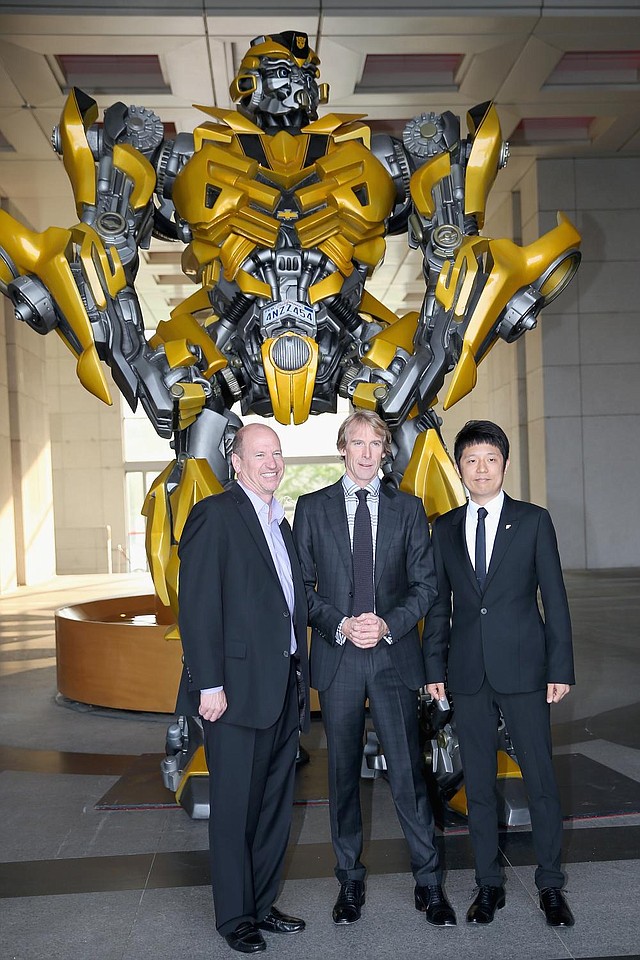Paramount ends Transformers dispute in China
Vice Chairman of Paramount Rob Moore, director Michael Bay and Pangu Hotel general manager Norman Song pose for photos beside a Bumblebee Autobot at Beijing’s Pangu Hotel recently.
Friday, June 27, 2014
BEIJING -- Hollywood studios, salivating over China's booming movie market, are falling over themselves to sew up deals on the mainland. But just days before its global launch of Transformers: Age of Extinction, Paramount Pictures got a crash course in just how fraught such tie-ups can be.
The studio had been hit with a sudden punch: Pangu Plaza, a Beijing luxury hotel, mall and office complex, was livid over what it claimed was a product-placement deal gone sour. Pangu said last week that it was cutting off cooperation with the film, filing a lawsuit and asking Chinese regulators to postpone the movie's release.
Any delay of today's opening could potentially have cost Paramount millions -- the first three installments of the Transformers franchise have done increasingly well on the mainland: 2007's original grossed $45 million, the 2009 sequel took in $72 million, and the third film hauled in $172 million in 2011.
So Paramount sprang into action.
They swiftly moved a giant replica of the Bumblebee Transformer to the entry of the dragon-shaped Pangu hotel. Paramount Vice Chairman Rob Moore, director Michael Bay, producer Lorenzo Di Bonaventura and star Jack Reynor jetted in to hold a news conference, and a big Beijing premiere was quickly organized.
The whirlwind of activity shows the lengths to which Hollywood is willing to go to to keep its Chinese partnerships on track. The alternative is to become a Los Angeles studio branded by Chinese business partners as unreliable in the world's No. 2 movie market.
"It was unfortunate that we had this misunderstanding," Moore said at a news conference inside a massive ballroom at the hotel.
He and the Paramount entourage answered questions onstage in front of a giant screen reading "Celebration Before the Premiere." The local press corps ate canapes, drank wine and pocketed $50 "transportation fees" for attending the event.
But the tensions were still palpable when the 13-minute ceremony ended.
In the hotel's driveway, Moore haggled over the wording of a joint English and Chinese statement that was supposed to go out to the media.
A Pangu executive puffed on a cigarette and yelled at an interpreter that he was dissatisfied. The Beijing event came after Paramount had the film's official unveiling in Hong Kong last week, then followed that up with a big showing at the Shanghai Film Festival.
Lu Tao, chief executive of Beijing Pangu Investment Co., even called a news conference. He told reporters that the company dropped its request to block the movie's release, but still planned on filing lawsuits over the product-placement contract.
He said Monday that the investment firm paid $1.6 million in the product-placement deal.
In exchange, Pangu was to benefit in five ways: It would appear in the film for at least 20 seconds; host an exhibit of Transformer props at the hotel at least eight months; be allowed to license Transformers imagery for consumer products and retain all income from their sales; appear in all promotional materials; and host a "VIP celebration" with cast, director and Paramount leaders ahead of a premiere.
Lu said Pangu started to get nervous about the arrangement in February, and reached out to two companies that signed the original deal -- Jiaflix China and Chengxin. Lu blamed the two companies, which acted as middlemen in forging the contracts with Paramount.
Jiaflix is one of Paramount's production and marketing partners in China. It was founded by former Paramount President Sid Ganis, his cousin Marc Ganis and Kenneth Huang. Chengxin is run by Zhou Ning, a former soccer star.
At the 2013 Shanghai Film Festival, the Ganis cousins, along with Zhou, appeared alongside Paramount executive LeeAnne Stables and touted the Pangu Plaza product-placement deal.
But Pangu officials began to figure out that terms of the contract Jiaflix and Chengxin set up were not being honored. And during the Hong Kong premiere, they realized that the hotel never got its 20 seconds in the film.
Lu said Pangu decided that it had been "cheated" -- and started pursuing litigation.
Representatives from Jiaflix and Chengxin could not be reached for comment.
Paramount's last-minute dash of diplomacy appears to have worked as far as Pangu is concerned.
Lu said the studio's response over the weekend was "positive" and "sincere" and that Pangu wants the film "to be a huge success in China."
"I think this is a very good reminder to Chinese companies seeking international cooperation not to be cheated by the middleman," Lu said.
The Pangu deal was but one of several Chinese product-placement deals for the film, which also shot in multiple locations in the country. Bay filmed scenes for Transformers: Age of Extinction in Hong Kong, Beijing, Tianjin and elsewhere.
Along the way, Bay faced difficulties while making the movie in China, including being assaulted by a man in Hong Kong who attempted to extort money from the production.
But Monday, with the finish line in sight, Bay and his studio tried to put on a positive face. For now, the Transformers show will go on in China.
“I want to put all this misunderstanding aside and just celebrate the great movie we shot in China,” Bay said. “I hope everyone enjoys it.”
MovieStyle on 06/27/2014
